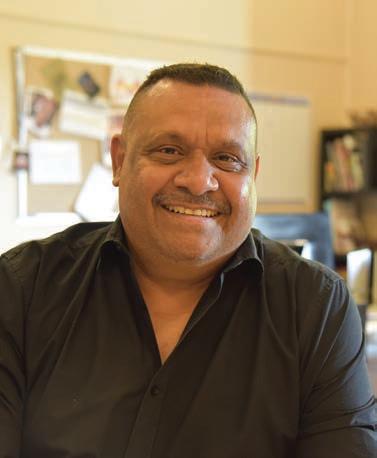
13 minute read
The Daly River comes to Adelaide
To celebrate 30 years of operation, Tandanya National Aboriginal Cultural Institute hosted the inaugural ‘First Nations Hub’ during the Adelaide Fringe Festival in February. The new event fit perfectly with the original concept for Tandanya, CEO Dennis Stokes told Aboriginal Way.
“Tandanya was formed in 1989 by a group of people who wanted to maintain culture and highlight culture to the wider community and so they created an organisation to be able to perform and showcase Aboriginal and Torres Strait Islander culture to Australia” Mr Stokes said.
Advertisement
That makes the First Nations Hub a perfect event for Tandanya according to Mr Stokes.
“Look, it’s the only institute of its kind in Australia. It’s a First Nations institute. It is what we should be doing, and it’s what we want to do, it’s the place that we should be doing these sorts of things. We’ve got the facilities here, let’s utilise that and let’s bring in the community.
The Fringe program celebrated the relaunch the Tandanya café space as a home where artists from local, national and global communities felt welcome to gather together.
“We’ve ultilised that café to make it a place that all the artists, whether they’re performing at Tandanya or not, can come, First Nations people can come and just all be together, and mingle and network, and just be a part of our culture” Mr Stokes said ahead of the event.
This year’s unique Fringe program was completely dedicated to First Nations artists and creatives, with Tandanya presenting a line-up of high-calibre productions, including something for everyone across the genres of theatre, dance, cabaret, music, film, comedy and visual arts.
In 2020, Tandanya partnered with Adelaide Fringe to host their signature event, Yabarra: Dreaming in Light. In 2019, Yabarra lit up the banks of the River Torrens drawing huge crowds.
In 2020, and for all 31 days and nights of the Fringe, audiences were invited to experience Yabarra as a unique indoor cultural experience at Tandanya.
At the heart of the First Nations Hub experience were short runs of the theatrical productions I Don’t Wanna Play House and The Daly River Girl.
I Don’t Wanna Play House is Pakana woman Tammy Anderson’s criticallyacclaimed one-woman show, ‘a swirl of monologue, movement and song which relives the abuse she and her family endured’.
The Daly River Girl depicts writer/actor Tessa Rose’s journey growing up with foster families, away from her natural mother, family and country. Read more about Tessa Rose’s life and work below.
Each Saturday night of the Fringe, Blacklist Cabaret hosted a cabaret line-up of A-list First Nations artists of colour from across the festival, hosted and curated by 2020 Adelaide Fringe Ambassador – the formidable Fez Faanana.
Tandanya’s First Nations Hub also included a line-up of comedians, the 2019 Adelaide Fringe Best Emerging Artist award winner Spirit performed by Yellaka, live music by artists including Melbourne based electronic dance duo The Merindas and Adelaide’s very own Nathan May, an Indigenous contemporary dance masterclass, free film screenings and a weekly free cultural workshop series.
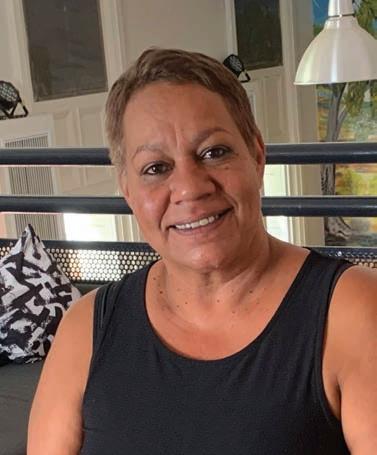
The powerful story of one Indigenous child growing up in non-Aboriginal foster families has been explored in a play presented at Tandanya during the Adelaide Fringe Festival.
Actor Tessa Rose wanted to speak about her personal experience growing up in foster homes and so she created her one-woman play, The Daly River Girl.
Ms Rose has regularly appeared on TV, film and theatre across Australia. She’s had roles in Top End Wedding, Redfern Now and also with Bangarra Dance Theatre.
She wanted to tell her story to audiences around Australia to promote understanding for Aboriginal people and their experiences in the wider community.
“It’s my personal story about growing up with non-Indigenous foster families, a long, long way from my community and from my home. people that live in the long grass or just Indigenous people in general who come in from the communities and visit family that are staying in town. The racism is just rampant.
“I just wanted to say to those people, if you just stopped and maybe asked a few questions and listened, you might get an understanding of the plight of others, what their experience has been.”
Ms Rose felt she was in a position to share her own story to promote that empathy.
“I wasn’t from stolen generation, but I was a ward of the state and went through numerous foster families and it’s traumatic. It takes many, many years to get past that and through that. So I just thought by sharing my story, people, audiences may be able to go away with a conversation or it might bring up a conversation, start a debate and talk about it” she said.
Ms Rose was not subject to abuse as a child, a sad reality for many displaced children, however she still felt loss and pain.
“Being a 4-year-old girl to a 12-year-old, I wanted to tell it in my own words in how I felt with growing up with different foster families, because it was traumatic. You’re going from one foster family and then, you’re with them for a certain amount of time so you fall in love with them and what not. And then, you’re just disregarded and then, you’ve got to go to another foster family. It’s very painful. It’s very painful.
“I just wanted to say, ‘This is how it made me feel.’” she said. she has found that challenging to deal with in later life.
“There’s… the Seventh Day Adventist upbringing, which was extremely strict.
“It took so long to get over the guilt. ‘That’s the devil’s music. Don’t dress like that. You don’t do this.’ and what not, and just constantly. It was just feeling so guilty and terrible within yourself as a person, as a human being.
“To realise that no, you’re not a horrible person, but just having that really strict Christianity took many years to get past and realise that we all have different beliefs and we’re all individuals and it doesn’t make you a bad person” she said. Ms Rose said that the transition from acting to writing was not a natural one for her. “This is my first play that I’ve written. A fellow actor suggested to me, ‘You should write your story,’ and I’m going, ‘Don’t be ridiculous. I’ve never written anything in my life.’ He said ‘No, you must! Write, write, write, write, write!’”
Ms Rose eventually took on the challenge, but found the process of writing such personal material for the stage difficult. “It took four years to get to the first production, it took that long because I had to step away for sometimes three to six months at a time because it was bringing up all the pain and stuff that was all safely tucked away there somewhere” she said. Despite the difficulty, Ms Rose found that writing the work did become easier as it progressed.
“It got a lot easier, I must admit, when I was looking at earlier drafts, it was just all my writing was just really angry. And then without me even realising it as I went on to drafts, a lot of the anger subsided” she reflected.
Working with an experienced playwright and putting some distance between herself and her own character in her play was a breakthrough moment said Ms Rose.
“I was lucky enough to have Alana Valentine, who’s a brilliant playwright as my dramaturge. And that was when I was still very early stages of writing and I was finding it really difficult, and then she just said to me one day, ‘Give her a name’. And so once I did that, then I was writing about a character and it became so much easier for me to write.”
Ms Rose is not planning on making a permanent transition from actor to writer despite completing this work, she said.
“I’m not in a hurry to write another one. It’s very lonely because you’ve got a blank page, you’re choosing what topics to write about or what to speak about. And you’re just there for hours just alone writing.
While the play explores personal and sometimes painful stories, it is an entertaining and hopeful production according to Ms Rose
“When I first got into the rehearsal room with Alex Galeazzi, my director, I was just determined to have no happy ending.
“He just said, ‘No, you can’t just have all doom and gloom – for yourself and also, for the audience. We need to have some light and some shade and some laughter.’”
The Daly River Girl by Tessa Rose was performed at Tandanya in February and early March 2020.
Uluru Statement explored in Aldinga
Southern metropolitan community members have had an opportunity to learn more about the Uluru Statement from the Heart from prominent advocate for the reform Thomas Mayor.
On Friday 28 February, Torres Strait Islander man and signatory to the Uluru Statement Thomas Mayor visited Aldinga Library to speak about his new book, Finding the Heart of the Nation.
The book explains the evolution of the Statement, and the artwork on which it is presented. It also narrates the progress of the Statement in Aboriginal communities
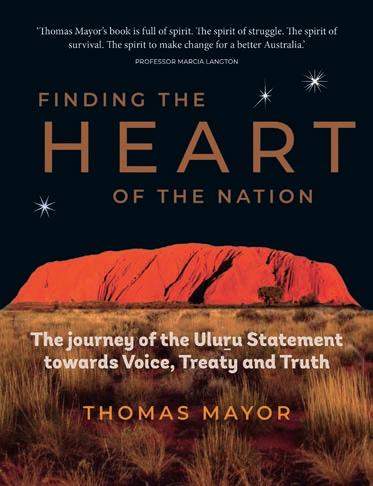
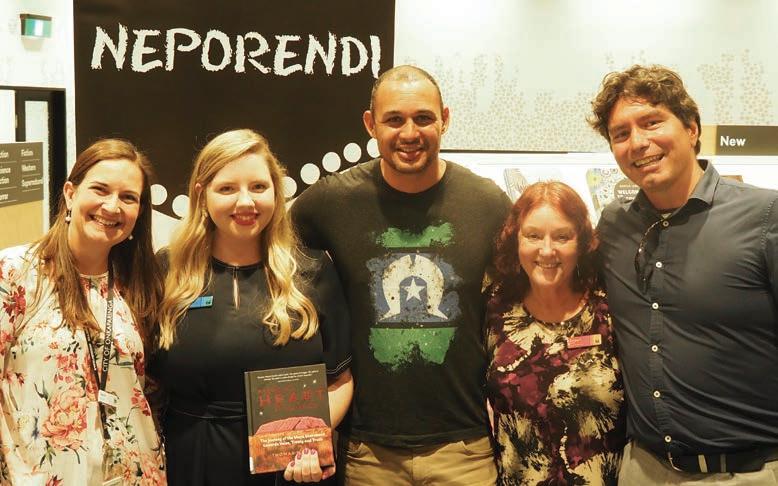
nationally and how it reflects and engages with individual communities and their needs, story and aspirations.
Thomas Mayor was in conversation at the library with fellow statement signatory Elijah Bravington who works at Neporendi Aboriginal Forum Inc.
The two discussed their own journeys towards the Uluru Statement, which calls for a First Nations Voice enshrined in the Australian Constitution, and the establishment of a Makarrata Commission to manage a process of agreementmaking with Australian governments.
Aldinga Library Librarian Eve Gregory said that Mr Mayor’s main message on the night was one of hope, despite delays and roadblocks to the implementation of the statement.
“He has not given up on the Uluru Statement, despite its dismissal by Prime Minister Malcom Turnbull in 2017” she said.
“He wants to educate the Australian public, who the Statement is addressed to, about the ways it will support Aboriginal and Torres Strait Islander peoples to have a voice in government decisions that affect their communities.”
Around one hundred and forty people attended to participate in that education, with many offering positive feedback.
“What an inspiration, so wonderful to be here and share the passion. May we walk hand-in-hand to a better Australia” said one attendee.
All members of the audience received a printed copy of the Uluru Statement From the Heart. At the end of the event, all attendees stood together with Mr Thomas to demand “Voice, Treaty, Truth”.
Ms Gregory said that the local community and library were inspired to continue in their learning about Aboriginal peoples’ perspectives.
“The vibe of the evening was one of positivity, motivation, and passion. Aldinga Library has had continuing success with events that focus on Aboriginal culture, stories and issues, and I’m so excited to keep exploring and educating in my role as a librarian and community member.”
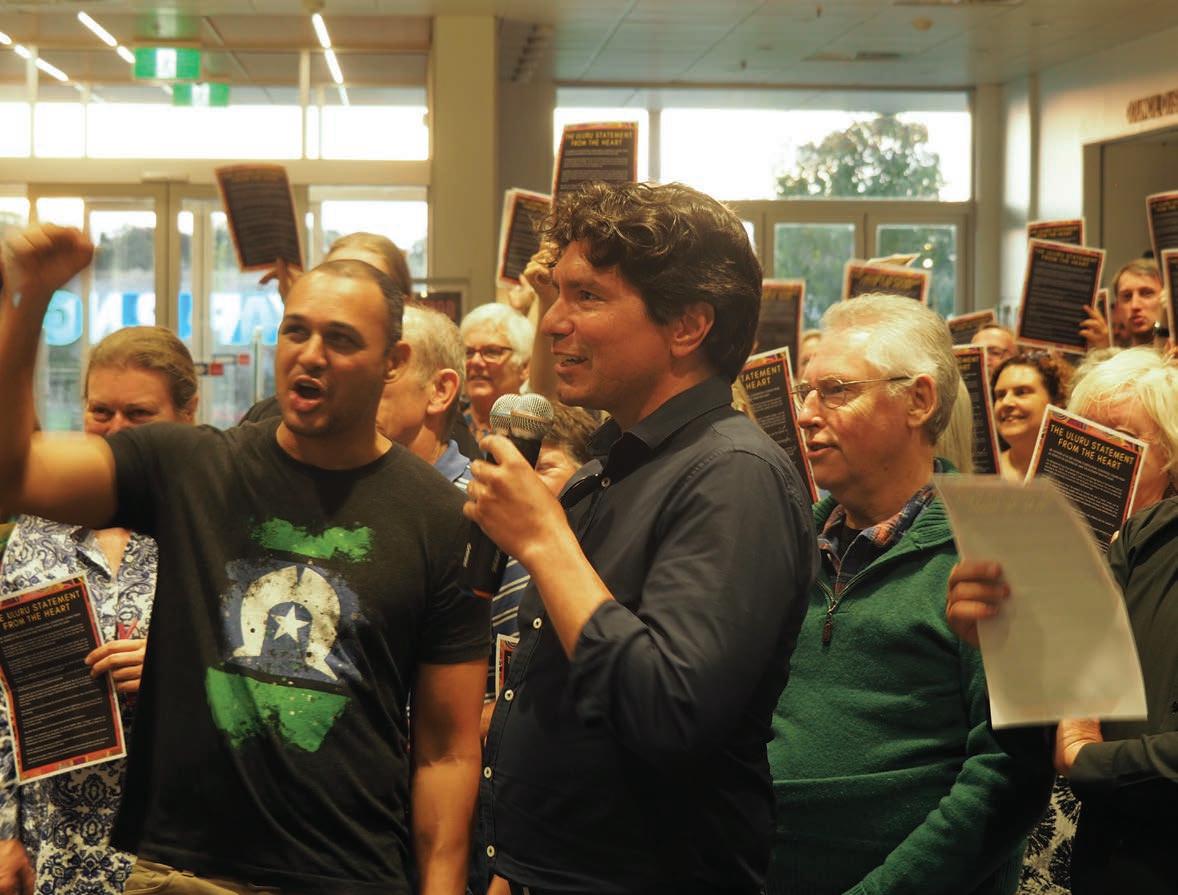
A two-year pilot program was announced earlier in the year to support new kinship carers to keep Aboriginal children and young people connected to culture and community, leading to better long-term outcomes. The pilot was originally scheduled to begin in mid-2020 before the disruptions due to the coronavirus were known. It is planned to be provided by one or more Aboriginal community controlled organisations. Currently all kinship carer support is provided through an internal Department for Child Protection program. Department for Child Protection Deputy Chief Executive Fiona Ward said keeping children connected with culture not only benefits them individually, but also helps to break inter-generational contact with the child protection system. “It is a fundamental right of Aboriginal children and young people in care to be connected to family, community and culture” Ms Ward said. “More than half of Aboriginal children in care live with kinship carers, who play a critical role in developing and maintaining this connection.
“This is about children knowing who they are and where they come from, which helps them to form a strong identity and maintain critical lifelong connections.” Aboriginal community-controlled organisations will provide support to regional and remote carers of Aboriginal children. The support offered will depend on the individual kinship carer’s needs, and may include: • using the organisation’s existing networks and knowledge to connect carers with Aboriginal community and culture; • connecting carers to practical support, services and networks, such as trauma specialists, education and health; • assisting carers to manage the impacts of inter-generational trauma for children
and young people in their care; • facilitating training, including on how to maintain cultural connections; • advocating on behalf of the carers to resolve issues or access services; and • providing advice and helping carers to understand and navigate the child protection system.
The pilot is based on a strong body of evidence following similar programs in the Northern Territory and Victoria.
“This pilot will help us to further embed the Aboriginal Child Placement Principle into our work and can have flow-on effects for the broader Aboriginal business sector” Ms Ward said.
“That is why we are committing to this pilot being delivered by Aboriginal community-controlled organisations.
The pilot program will be made available to new kinship carers of Aboriginal children and young people.
Native Title Conference postponed
The Australian Institute of Aboriginal and Torres Strait Islander Studies (AIATSIS) and NTSCORP have postponed the 2020 National Native Title Conference as a result of the changing and widespread impacts of COVID-19. The national event is currently scheduled for 18–21 October 2020. The conference will remain on Minjungbal Bundjalung Country in Tweed Heads with the ongoing support of the traditional owners. NEW DATE: 18–21 October, 2020.
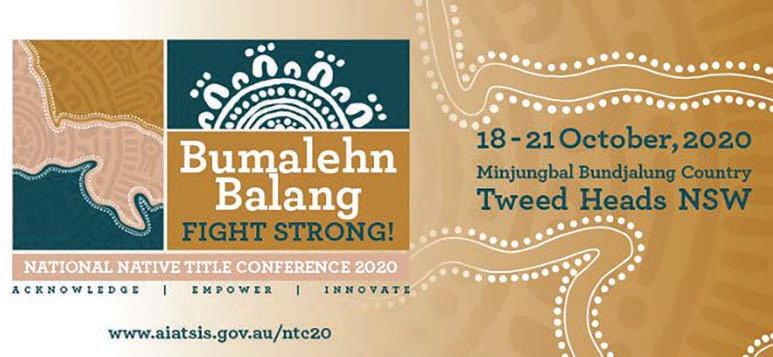
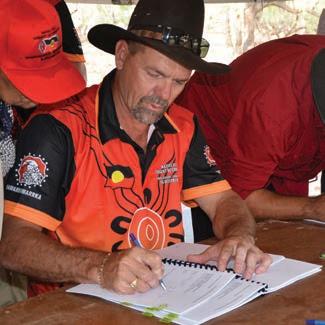
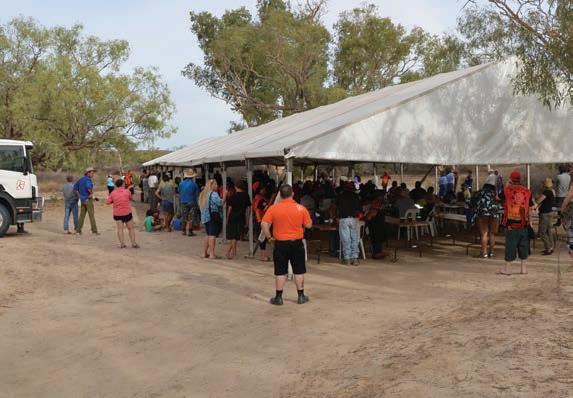
SANTS ser vices for your organisation
SANTS is an independent Aboriginal organisation with proven experience and expertise in providing a wide range of professional services to South Australian Aboriginal Nations. We are responsive to the needs and priorities of Aboriginal Corporations and can bring a unique understanding of and respect for culture and communities in our provision of services. We offer services in • Corporate Governance • Corporate Administration • Community Development • Native Title Legal Services SANTS offers a very competitive fee structure to Aboriginal Corporations to suit their financial circumstances.
Contact our Manager of Corporate and Community Development for a confidential discussion and further information: P (08) 8110 2800 • E info@nativetitlesa.org • W www.nativetitlesa.org
SOUTH AUSTRALIAN NATIVE TITLE SERVICES
Level 4 345 King William Street ADELAIDE SA 5000
Editor Keith Thomas
Communications Officers Lucy Kingston Kaliah Tsakalidis
Designer Alison Fort
Advertising Enquiries (08) 8110 2800
Circulation 10,000
If you have any stories of interest to our readers, please address any correspondence to:
editor@nativetitlesa.org
Aboriginal Way South Australian Native Title Services Level 4 345 King William Street ADELAIDE SA 5000
Ph: 8110 2800 Fax: 8110 2811 FREECALL: 1800 010 360
The Editor has the final decision on all stories and advertising that appear in this publication.
w w w.nativetitlesa.org
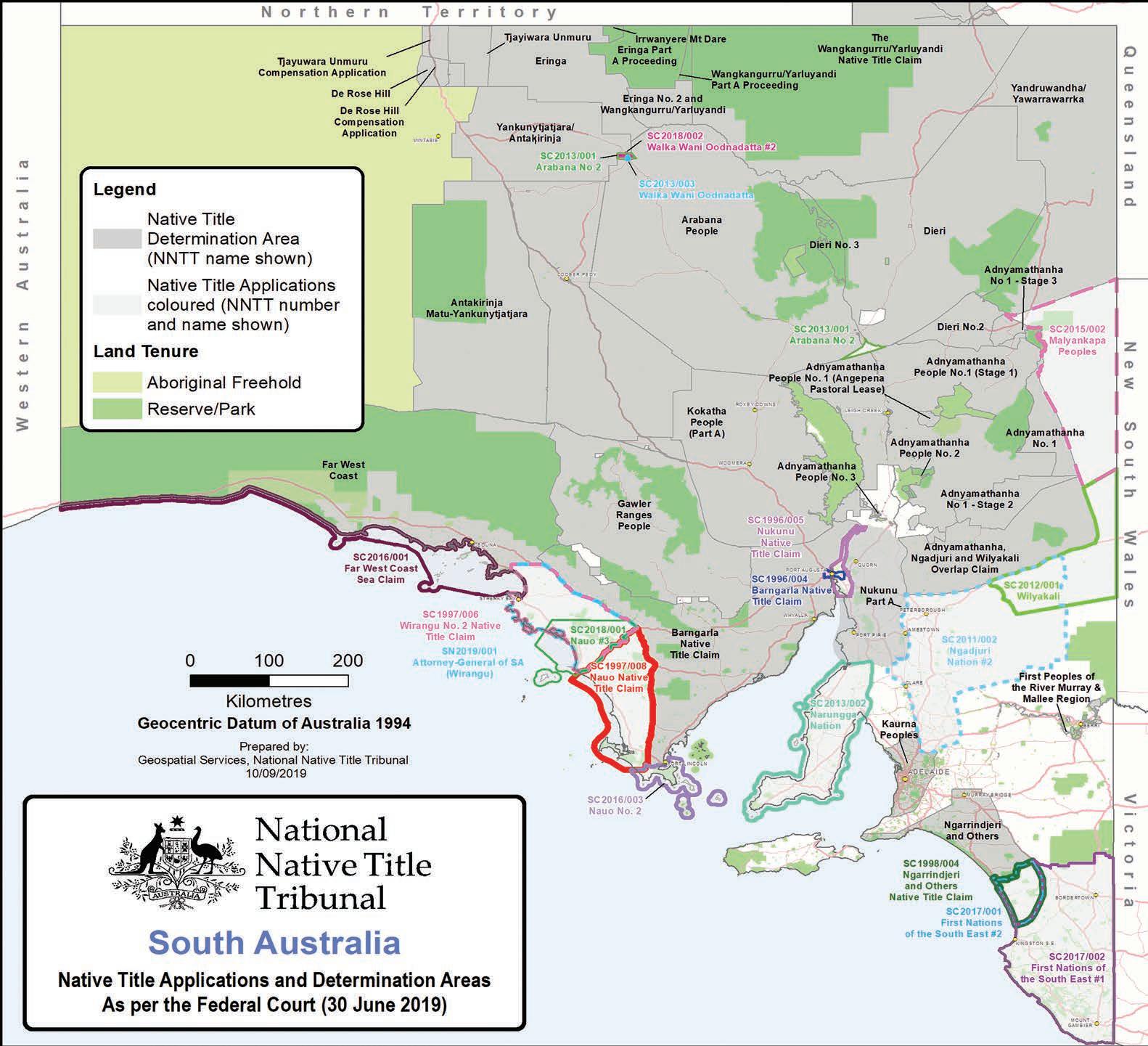
Get Aboriginal Way
ISSUE 78 Individuals or organisations can request free copies of this publication. Complete the form below and mail to 4/345 King William Street, Adelaide 5000 or email details to editor@nativetitlesa.org Name: ____________________________________________________ Address: __________________________________________________ Postcode: _______________ Phone: ____________________________________________________ Email: ____________________________________________________ No. of copies: ______________________________________________
…airs weekly on Indigenous and community radio. If you have an interesting story or event that you would like to share on radio, please contact Lucy Kingston on (08) 8110 2800 or email editor@nativetitlesa.org Listen online at https://www.nativetitlesa.org/aboriginal-way




